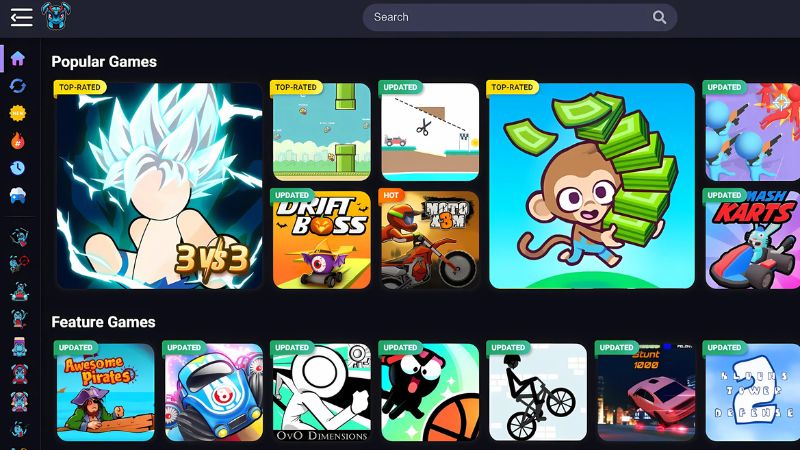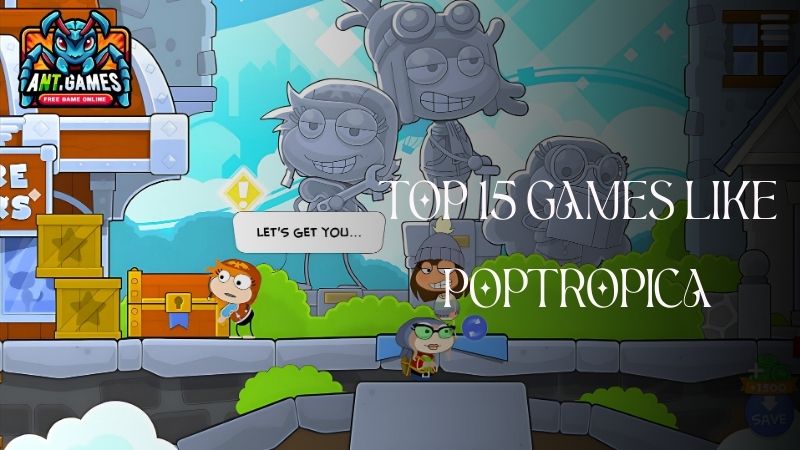You’ve likely encountered the notion that gaming is a frivolous pastime, but what if this perception isn’t entirely accurate? The advantages of interactive entertainment extend far beyond mere amusement. From enhancing cognitive functions to fostering social competencies, digital and analog games offer a surprising array of benefits.
Whether you’re a casual player engaging in mobile puzzle games or a dedicated enthusiast immersed in complex role-playing games (RPGs), you might be reaping rewards that aren’t immediately apparent..
In this article, AntGames will illustrate 12 benefits of video games and some guidelines for different ages when taking part in games. We also consider how different game genres – from action-adventure to simulation, from first-person shooters to educational games – might contribute to personal growth and development.
Improves cognitive ability
Video games can improve your cognitive ability. Gaming isn’t just entertainment; it’s a cognitive workout that enhances neuroplasticity and boosts gray matter volume in the brain. As you navigate virtual worlds, you sharpen your visuospatial skills and improve your ability to process visual information quickly. This mental exercise helps increase gray matter density in regions associated with memory, executive function, and fine motor control.
Gaming also provides stress relief, allowing psychological decompression while exercising cognitive abilities. The multitasking aspect of gaming, where players manage multiple objectives and make quick decisions, further supports brain function. With advancements in neurogaming, specialized video games may offer tailored brain training, promoting cognitive resilience and neuroprotection as we age.

Teaches better problem-solving skills
Games can teach you to be a better problem solver. Puzzle-solving and strategic thinking are key elements in many video and board games, helping to enhance problem-solving skills in creative ways. As you navigate complex game mechanics and rule systems, you’re improving your cognitive abilities and neuroplasticity.
Studies show that children who regularly play strategy-based games like chess or Settlers of Catan often see improved academic performance across subjects. This cognitive boost goes beyond memorization, fostering a growth mindset that thrives on overcoming challenges and adapting to change. Whether solving puzzles in single-player modes or working through challenges in multiplayer settings, games refine your analytical thinking and innovative problem-solving abilities.

Enhances manual dexterity
Video games offer more than just entertainment, they can significantly improve manual dexterity and fine motor skills. As players engage with virtual environments and controllers, they enhance hand-eye coordination through precise movements. The gameplay mechanics of modern video games challenge players to think quickly and execute movements accurately, training both the brain and hands to work in unison.
Therapeutic gaming has also become a valuable tool in physical and occupational therapy. Designed serious games aid patients in rehabilitation, improving dexterity in a motivating way. This approach combines physical activity with digital interaction, offering a comprehensive solution to motor skill challenges. Additionally, the skills gained from gaming, such as improved typing and instrument playing, translate to real-world tasks requiring fine motor control.

Improves visuomotor coordination
Playing video games enhances visuomotor abilities, particularly hand-eye coordination. Gamers constantly process visual stimuli and respond with precise physical actions, especially during quick-time events (QTEs) that require fast, accurate reactions. These challenges improve reaction time and synchronize visual input with motor output, which is key for sensorimotor integration.
The cognitive-motor skills developed through gaming can be transferred to real-world tasks, such as operating vehicles or participating in sports, where enhanced visual attention and spatial cognition are beneficial. Regular gaming promotes neuroplasticity, strengthening neural pathways and improving overall visuomotor performance. With advancements in virtual reality (VR) and augmented reality (AR), the potential for skill development is greater, offering immersive environments for more natural skill transfer.

Boosts vision
Video games, particularly action-oriented titles, can enhance visual acuity and perception, challenging the conventional belief that gaming leads to eye strain.
A groundbreaking study in ophthalmology explored the impact of gaming habits on non-gamers, focusing on visual cognition and neuroplasticity. Participants who engaged in action-packed video games for 30 hours over a month exhibited significant improvements in their visual acuity, contrast sensitivity, and perceptual learning. These individuals demonstrated an enhanced ability to discern subtle gradations in grayscale and improved contrast discrimination, indicative of heightened visual cortex functionality.
The findings challenge the notion that video games are detrimental to ocular health and instead suggest potential therapeutic applications in vision rehabilitation. This paradigm shift in understanding the relationship between digital media consumption and visual processing highlights the complex interplay between technology and human physiology.

Simplifies task-switching
Beyond fostering cognitive persistence, gaming also hones your cognitive flexibility, enhancing your ability to switch between tasks efficiently.
As gamers navigate through increasingly complex levels, they continuously manage their attentional resources, allocating focus to various challenges as they emerge. This practice in task-switching and attention allocation translates to improved executive function in daily life, where individuals are frequently required to pivot between different cognitive demands. The cognitive control developed through gaming can significantly boost overall attention management and help navigate the intricacies of multitasking more effectively.
However, it’s crucial to understand that outside the structured environment of gaming, task-switching can still present challenges. The real world doesn’t always provide the same clear cues, immediate feedback, or defined rule sets as games do.
Nevertheless, the cognitive skills honed through gaming, such as rapid information processing, decision-making under pressure, and mental flexibility, can notably enhance one’s ability to adapt to shifting priorities and manage competing demands in various contexts.

Develops social skills
Contrary to popular belief, video gaming can significantly improve social skills and foster meaningful connections among players. As gamers immerse themselves in online communities, they are presented with various opportunities for interaction that enhance communication. Multiplayer games often require teamwork, pushing players to collaborate with others to achieve shared goals.
Through gaming, players develop essential social skills such as effective communication, conflict resolution, leadership, adaptability, cultural awareness, and emotional intelligence. Moreover, the gaming experience promotes social cohesion, community building, cross-cultural understanding, and digital literacy.
Therefore, when faced with skepticism about gaming habits, players can emphasize that they are not just engaging in entertainment, but also honing invaluable social competencies that will benefit them in various aspects of life.

Increases physical activity
Gaming can be a great way to stay active. While gaming has often been associated with a sedentary lifestyle, modern technology is changing that. Exergaming, which combines exercise and gaming, has gained popularity, with developers integrating fitness-focused mechanics into games. Players can engage in cardiovascular activities, calisthenics, and other kinesthetic movements while playing, burning calories without even realizing it.
Augmented reality (AR) games like Pokémon GO encourage outdoor exploration, turning your surroundings into a virtual playground. These games often include exercise incentives, prompting players to walk more or complete physical challenges. They also fall under the category of fun online games to play with friends, as players can team up for raids, battle in gyms, or compete in special events together.

Benefits mental health
Video games offer more than just entertainment; they can have significant mental health benefits. Therapeutic gaming has become a recognized field in psychotherapy, known for its ability to reduce stress and build emotional resilience. As players engage in virtual worlds, they experience cognitive improvements, such as better problem-solving skills, enhanced working memory, and increased cognitive flexibility.
Video games also support mood regulation, attention management, and executive functioning. Role-playing games (RPGs) enhance empathy and perspective-taking, while strategy games boost planning and decision-making. Additionally, the gamification of mental health treatments, such as serious games targeting depression, anxiety, and PTSD, has proven effective in increasing treatment adherence and engagement.

Makes learning fun
Video games offer an enjoyable way to learn while playing. These interactive digital environments provide cognitive benefits, improving players’ critical thinking, problem-solving, and decision-making skills. As gamers navigate complex worlds, they inadvertently enhance their mental faculties.
Modern video games cover a wide range of subjects, from history and science to linguistics and mathematics. Players learn about ancient civilizations in strategy games, grasp physics principles through in-game mechanics, and pick up new languages via dialogue and subtitles.
Games also promote personal development. RPGs tackle moral dilemmas, fostering ethical reasoning and empathy, while multiplayer games enhance teamwork, communication, and leadership skills. Simulation games provide practical experience in fields like aviation and urban planning. The gamification of learning makes education enjoyable and memorable, seamlessly blending entertainment with knowledge acquisition.

See more: Unblocked games at school
Inspires persistence
Video games consistently challenge players to overcome obstacles, fostering a sense of persistence that can translate into real-life situations. As you navigate through increasingly difficult levels, you’re developing persistence strategies and problem-solving skills that can be applied beyond the gaming realm. Gaming psychology and cognitive science suggest that the challenge adaptation and neuroplasticity you experience while playing help you become more resilient in facing real-world adversities.
Researchers in the fields of gamification and behavioral psychology argue that video games’ reward systems, goal-oriented gameplay, and achievement mechanics contribute to improved persistence and grit. When you’re engrossed in a game, you’re constantly pushed to achieve objectives, no matter how many times you fail. This repetitive process of trying, failing, and trying again until you succeed trains your mind to persist in the face of adversity, enhancing your cognitive flexibility and emotional regulation.

Rewards creativity and accomplishment
Exploration in interactive entertainment offers players a world of creative possibilities, rewarding them with a sense of accomplishment and discovery. As you delve into immersive digital realms, you face unique challenges that push your cognitive limits. Your accomplishments highlight your creativity and problem-solving skills, motivating you to continue exploring.
Game design often encourages artistic expression, letting you craft solutions, personalize gameplay, or build intricate virtual creations. This freedom to experiment enhances your entertainment experience while fostering curiosity and cognitive growth.
In multiplayer games, social dynamics add complexity, with collaboration and competition nurturing real-world skills like teamwork, communication, and strategy. Shared experiences in these digital spaces often lead to lasting friendships, extending the rewards of exploration beyond the game.

How much gaming is too much?
While gaming offers numerous benefits, it’s crucial to strike a balance between enjoyment and excessive gameplay.
Gaming addiction, a recognized behavioral disorder by the World Health Organization, can develop when individuals prioritize virtual environments over real-life responsibilities and relationships. Excessive gaming may lead to negative consequences such as poor academic or work performance, social isolation, and neglected physical health.
For children and adolescents, gaming becomes problematic when it interferes with schoolwork, family interactions, or extracurricular activities. Research suggests that more than two hours of daily screen time, including gaming, can impact a child’s cognitive development and overall well-being.
Gaming moderation involves setting realistic limits, practicing self-control, and recognizing warning signs of addiction. Adults should be mindful of their gaming habits and seek professional help if they experience difficulty controlling their gameplay.
Balancing gaming with other activities is essential for holistic well-being. Engaging in physical exercise, maintaining social connections, pursuing hobbies, and fulfilling work or academic obligations should take precedence over extended gaming sessions.

See more: Advantages of playing an MMORPG
Which is a trustworthy website for playing video games?
If you’re looking for a reliable website to play video games, AntGames is the answer. AntGames is one of the top platforms for free, browser-based games, offering a wide range of genres for all types of players. Whether you’re into action games, arcade games, driving games, shooting games or skill games, AntGames has something for everyone. The platform ensures a safe, secure gaming environment with no hidden fees or harmful content. You can jump into the action directly in your browser—no downloads or complicated installations required.
AntGames stands out not only for its diverse game selection but also for its focus on enhancing cognitive skills, hand-eye coordination, and social interaction. Many of the games are designed to challenge your mind, improve problem-solving, and boost critical thinking. Action-packed games sharpen reflexes and coordination, while multiplayer options let you connect and compete with friends or players worldwide, promoting teamwork and communication. Plus, AntGames is constantly updated with new titles, ensuring there’s always fresh content to enjoy. Whether you’re gaming on a PC, laptop, or mobile device, AntGames provides a smooth and seamless experience across all platforms.

Guidelines for different ages when playing games
When selecting games for children, it’s crucial to adhere to age-appropriate rating guidelines. Parents and guardians should carefully consider the Entertainment Software Rating Board (ESRB) ratings, which provide comprehensive information about game content and recommended age groups.
To maximize the benefits of gaming, caregivers can implement 8 strategies:
- Choose educational games: Select titles that promote cognitive development, problem-solving skills, and learning outcomes aligned with the child’s educational level.
- Establish time limits: Implement a balanced approach to screen time, setting clear boundaries for gaming sessions to prevent excessive use and potential addiction.
- Engage in discussions: Foster open communication about game content, themes, and potential impacts, encouraging critical thinking and media literacy skills.
- Consider PEGI ratings: In addition to ESRB, the Pan European Game Information (PEGI) system offers another perspective on age-appropriate content for a global audience.
- Explore genre diversity: Introduce children to various game genres, including puzzle, strategy, and simulation games, to broaden their gaming experiences and skills.
- Monitor online interactions: For multiplayer games, supervise and guide children’s online interactions to ensure a safe and positive gaming environment.
- Balance gaming with other activities: Encourage a well-rounded lifestyle by incorporating physical activities, social interactions, and other hobbies alongside gaming.
- Stay informed: Keep up-to-date with the latest trends in gaming and potential concerns related to specific titles or platforms.

Explore More: Best free browser games online you should play
Rating guidelines
Understanding game ratings is crucial for both parents and players to make informed decisions about age-appropriate content. The Entertainment Software Rating Board (ESRB) provides guidelines to help navigate the gaming world. Dr. Austerman, a child psychology expert, clarifies that there is no direct link between video game violence and real-world aggression, though content appropriateness is vital for healthy cognitive development.
The ESRB’s rating system ranges from Early Childhood (EC) to Adults Only (AO), with detailed content descriptors covering violence, sexual themes, language, and substance use. Parents can utilize parental controls to filter content, manage screen time, and monitor online interactions for a safer gaming experience. For more details, check out Why are games age restricted?.
How parents can make sure video games provide benefits
Parents play a crucial role in maximizing the educational benefits of video games while minimizing potential drawbacks. By actively engaging with their child’s gaming experience, parents can optimize cognitive and social-emotional learning.
When choosing games, parents should focus on titles that align with their child’s interests while also providing cognitive challenges, problem-solving, and skill-building. Educational, strategy, and simulation games offer valuable learning experiences in areas like STEM, history, and the creative arts.
To promote digital wellbeing, parents should set reasonable time limits and encourage a balanced lifestyle, incorporating physical activity, social interaction, and academics. This approach helps prevent gaming addiction and supports overall development.
Parents can enhance learning by connecting in-game concepts to real-world applications. For example, discussing resource management in strategy games can spark discussions about economics and sustainability. Additionally, encouraging children to explain their strategies and decision-making fosters critical thinking and problem-solving skills beyond the game.
Let’s Clear Up Some Confusion!
Can games reduce anxiety?
Yes! Recent studies suggest certain video game genres can reduce anxiety and improve mental well-being. Games that encourage mindfulness, such as puzzle-solving or open-world exploration, can help ease rumination and boost cognitive focus. Even action games, when played in moderation, provide a cathartic outlet for stress.
Puzzle games like Tetris and Bejeweled can create a state of flow, distracting from anxious thoughts. Exploration games like Journey and Abzu promote calmness, while cooperative games such as Stardew Valley foster connection and accomplishment.
What games are good for depression?
Several browser games and other experiences can be beneficial for individuals dealing with depression, providing themes of mental health, relaxation, and positive interactions. One such game is Depression Quest, an interactive fiction game that helps players understand the daily challenges of living with depression through narrative choices.
Gris is a visually captivating platformer that explores emotions and depression, offering a deeply moving experience. Rainbow Billy: The Curse of the Leviathan promotes mental health by encouraging players to confront their fears through RPG-style battles.
What game can relax your mind?
When it comes to relaxing and reducing stress, Candy Crush is a prime example of a game that offers cognitive benefits. Its colorful and engaging design provides a perfect blend of mindful play and casual competition, making it ideal for alleviating anxiety and promoting relaxation. Accessible on smartphones, Candy Crush allows you to unwind anytime, anywhere, serving as a portable stress management tool. Its hypnotic qualities can help players enter a state of flow, disconnecting from worries.
Other puzzle games like Tetris, Bejeweled, and Two Dots offer similar benefits, engaging the brain in problem-solving while providing a low-pressure environment for mental relaxation.
AntGames hopes this article has helped you better understand the 12 powerful benefits of video games and provided valuable insights for players of all ages interested in the world of video games. While gaming offers a wide range of cognitive, social, and emotional advantages, it’s essential to maintain a balanced approach to ensure gaming remains a positive and healthy part of your daily routine. By setting limits and making mindful choices, you can fully enjoy the rewards that gaming has to offer while keeping other aspects of your life in balance.
Now, dive into a world of exciting, free-to-play games on AntGames and experience the fun and benefits for yourself. Whether you’re looking to improve your skills, challenge your mind, or simply have fun, AntGames has something for everyone. Happy gaming!





